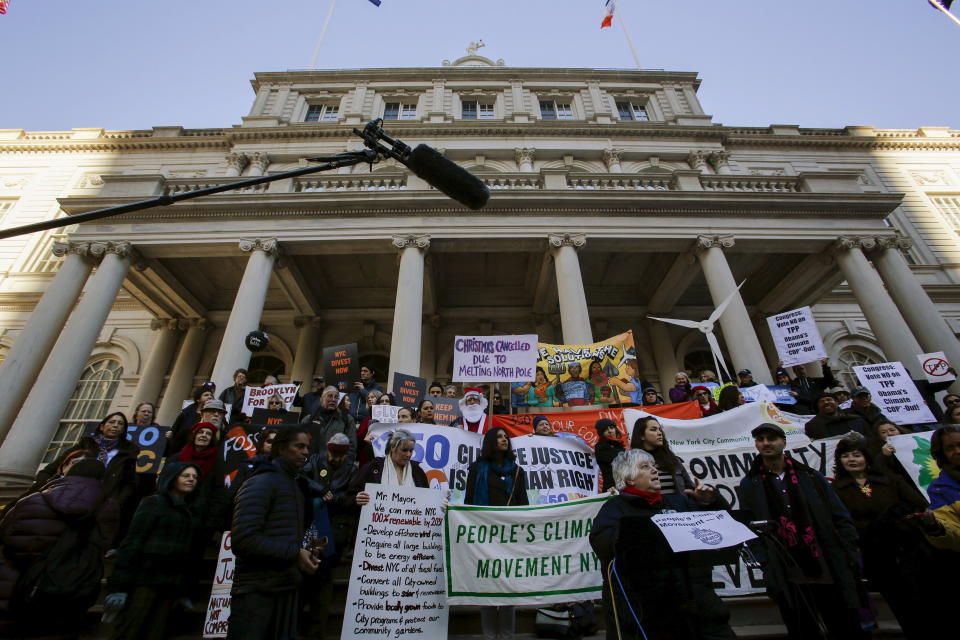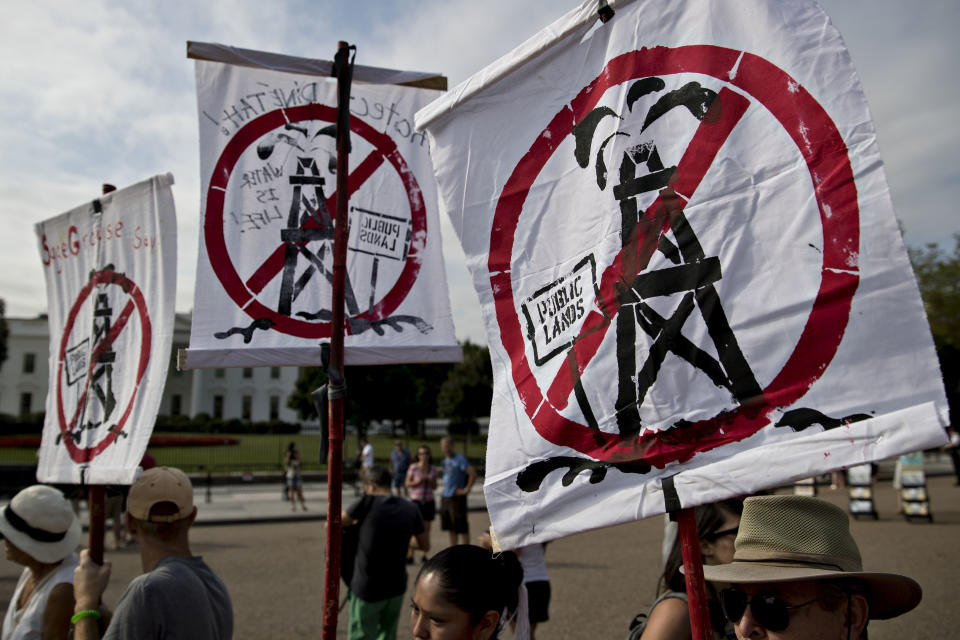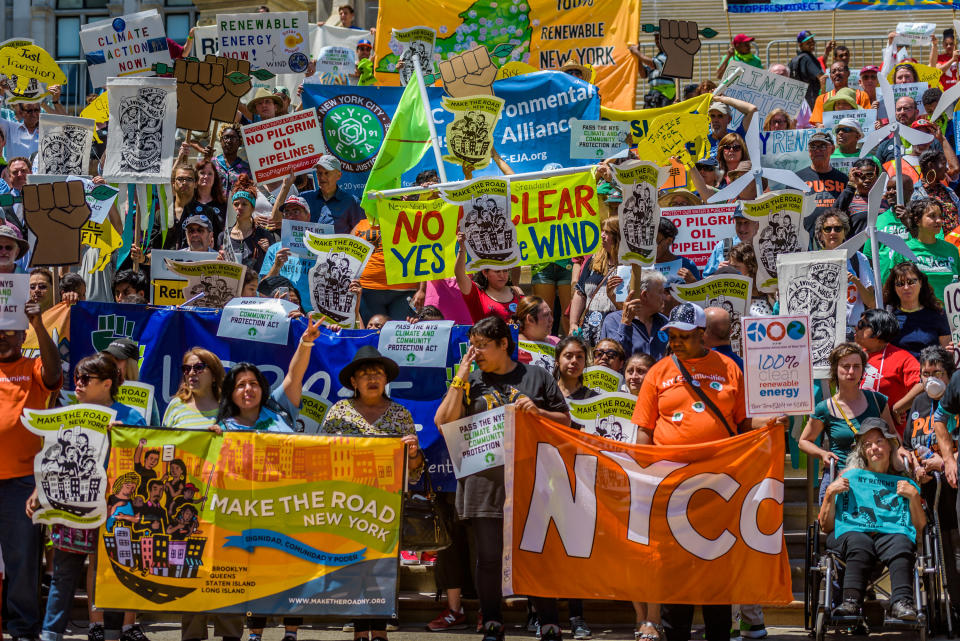Trump Administration To Propose Scrapping Major Obama-Era Climate Change Policy
The Trump administration is poised to scrap a policy limiting greenhouse gas emissions from power plants, furthering its attack on the United States’ efforts to combat climate change.
The Environmental Protection Agency is prepared to issue a proposal to “repeal” the Clean Power Plan, according to a 43-page draft document obtained by HuffPost. The agency argues that the Obama-era policy “exceeds the EPA’s statutory authority.”
The EPA has not determined if it will introduce a replacement rule to regulate greenhouse gases from power plants, or what such a rule would look like, according to the document.
“The EPA is considering whether it is appropriate to propose such a rule,” and it plans to solicit information on emission reduction systems, the draft states.
EPA Administrator Scott Pruitt said Monday that he would sign the proposal the next day.
President Donald Trump has repeatedly condemned the Clean Power Plan, calling it “stupid” and a “crushing attack on American industry.” In March, he signed an executive order demanding that the EPA review the policy. Repealing it would fulfill a major campaign promise.
However, Vox notes that the EPA would have to go through a lengthy ― possibly years-long ― rule-making process to fully repeal the Clean Power Plan. That timeline contradicts Trump’s declaration last month that the policy was already as good as dead. “Did you see what I did to that? Boom, gone,” he told a cheering crowd in Alabama at the time.
Former EPA Administrator Gina McCarthy said the looming proposal was “a wholesale retreat from EPA’s legal, scientific and moral obligation to address the threats of climate change.”
“This administration is using contrived problems with our energy system to take money out of consumers’ pockets and giving it to fossil fuel companies, so they can force a shift away from clean energy and back to dirty fossil fuel. That’s not ‘back to basics,’ that’s just plain backwards,” she said Friday, referring to Pruitt’s so-called “Back-To-Basics” agenda.
When the Clean Power Plan was unveiled in 2015, it was hailed as the strongest action ever taken by a U.S. president to combat climate change.
Many scientists and environmentalists saw the policy, which aims to cut greenhouse gas emissions from power plants by 32 percent by 2030, as the most important tool in the federal government’s arsenal to help the U.S. meet its Paris Climate Agreement goals.
Trump announced in May that the U.S. would withdraw from the global climate deal, making it one of three countries not in the accord.
However, the Clean Power Plan has had its fair share of opponents.
More than two dozen states challenged the Clean Power Plan in court, prompting the Supreme Court to temporarily block it. The D.C. Circuit Court of Appeals had set a deadline for Friday to hear from the EPA on how it plans to move forward with the policy.
Myron Ebell, director of the Center for Energy and Environment at the Competitive Enterprise Institute, who previously served as Trump’s EPA adviser, said Friday that he hopes the Clean Power Plan will be rescinded “in its entirety.”
“Scrapping the ‘Clean Power’ Plan is a key part of President Trump’s de-regulatory agenda, which is designed to get the economy moving again,” he said in a statement. “This rule and other greenhouse gas emissions rules are depressing investment and job growth in resource and manufacturing industries.”
Ebell is a longtime climate change denier and has called the environmental movement the “greatest threat to freedom and prosperity in the modern world.”
This article has been updated with additional details from the EPA document, as well as comments from McCarthy and Ebell.
Alexander C. Kaufman contributed reporting.
Related Coverage
Scott Pruitt Has Sued The Environmental Protection Agency 13 Times. Now He Wants To Lead It.
Betsy DeVos Visits Science Fair, Refuses To Talk About Climate Science
How Leaving The Paris Accord Will Hurt Our Health
Also on HuffPost
Strengthen city, county and state climate efforts

“The ominous signals coming out of D.C. point to even more work needed at the city and state level,” said Kate Kiely, national media deputy director at the Natural Resources Defense Council. In November, the NRDC announced partnerships with 20 cities across the country from St. Paul, Minnesota, to Houston, Texas, to make strides in renewable energy.
According to Brune, cities could have an especially big influence in the climate change fight. “We should be pushing cities to go 100 percent clean energy and to reject natural gas and coal and other fossil fuels,” he said. “A majority of people now live in cities, so this could have a dramatic impact.”
In the U.S., at least 20 cities have made commitments to rely completely on clean energy.
“People should organize and get their own cities to move forward,” Brune said.
Contact your mayor, city council, or county or state representative and get them to set a timeline to stop using fossil fuels.
Push companies and institutions to divest from fossil fuels

As of December, more than 640 institutions worldwide, including several universities, churches and for-profit companies and banks, have pledged to divest from their fossil fuel investments. According to Go Fossil Free, a 350.org campaign, the commitments amount to more than $3.4 trillion.
Consumers should petition companies to ditch their fossil fuel investments, and students should urge their schools and colleges to do the same.
“As we wrap up the hottest year in history, we know that investments in the fossil fuel industry fund these climate impacts. That’s why it’s more critical than ever that we push our institutions to divest from the fossil fuel companies that are knowingly perpetuating the climate crisis,” Lindsay Meiman, U.S. communications coordinator for 350.org, told HuffPost.
Want to push a company, school or place of worship to divest from fossil fuels? 350.org has a list of resources to help you start a campaign. Or find an existing one to get involved in.
Put your money where your mouth is

“Your ATM card or checking account or your mortgage, these should not be financed by companies that are taking your checking fees or other payments to subsidize the Dakota Access Pipeline or finance drilling offshore. Make sure your money aligns with your values,” Brune said.
In September, Amalgamated Bank became the first North American bank to commit to divest 100 percent from fossil fuels. Aspiration has bank accounts that are fossil fuel-free, and Beneficial State Bank has credit cards that don’t invest in fossil fuels.
Anthony Hobley, CEO of the Carbon Tracker Initiative, said consumers should also ensure that their pensions, 401(k) or other retirement savings accounts are similarly not underwriting fossil fuel companies.
“A lot of pressure can be made through the financial industry,” Hobley said from London. “Ordinary people who hold pensions can put pressure on companies through their pensions. Put pressure on the people who manage your money and that’s one way to keep pressure on those companies too.”
The financial services companies that manage retirement accounts “aren’t used to getting many letters from the people whose money they manage,” Hobley added. “It wouldn’t take much of an organized effort for them to take notice.”
Are your investments supporting fossil fuels? FossilFreeFunds.org is a web tool that allows people to check whether their individual investments or employer-provided 401(k) is supporting coal companies, oil and gas producers, and fossil-fired utilities.
Making a "financial case" for clean energy

With new clean energy technologies getting more efficient and cheaper than fossil fuels, a transition to renewables is “inevitable,” said Hobley. It’s just a matter of time.
“Trump can no more stop this transition than a previous U.S. president could’ve stopped the transition from steam locomotives to the automobile or the typewriter to the computer. The technological genie is already out of the bag,” he said. “It’s not a case of ‘if,’ but ‘when.’ But the ‘when’ is important because of the 2 degrees budget, and that’s where a lack of political leadership or resistance can have a real impact.”
Clear political leadership from both the U.S. and China could mean a "smoother" and faster transition to clean energy. A lack thereof, however, could “make it easier for big oil and gas companies to stay in denial” — and that “would be to their detriment,” Hobley said. “It would mean pouring more money, billions or trillions of dollars, into fossil fuel assets that we simply don’t need.”
Trump now has the opportunity to make the United States a leader in clean energy.
“These are complicated and highly technical products,” Hobley said. “With an educated and skilled workforce, these are the kinds of things that should be manufactured in the U.S.”
Creating new jobs was a central part of Trump’s election platform. Maybe someone should remind him that the clean energy industry creates more jobs per unit of energy than coal and natural gas. In 2015, the number of U.S. jobs in solar energy overtook those in oil and natural gas extraction for the very first time.
A 2015 report by NextGen Climate America found that a transition to clean energy would add a million jobs by 2030 and up to 2 million jobs by 2050, while increasing the nation's gross domestic product by $290 billion and boosting household income.
We should be citing such figures and urging utility companies and public utility commissions to embrace clean energy. (Public utility commissions regularly hold hearings that are open to the public. Attend them, and voice your thoughts!)
Speak out!

“Talk to your friends and family, and make sure your representatives are making good decisions,” Aliya Haq, deputy director of NRDC’s Clean Power Plan Initiative, wrote in a blog post. “The main reason elected officials do anything difficult is because their constituents make them.”
In the coming months and years, “there will be mass mobilizations that folks should join to push back against Trump’s regressive policies and hateful rhetoric,” said 350.org’s Meiman. “Folks can engage online by joining online actions, signing petitions and contributing their voice on social media to push back on Trump’s agenda.”
You can also participate in protests in your area or join and support local nonprofits in their fight against climate change.
Reduce your own carbon footprint

“Building heating and cooling are among the biggest uses of energy,” said NRDC’s Haq. Make your home more energy-efficient by sealing drafts and ensuring your home is adequately insulated and ventilated too.
Also consider changing your diet. “Cut down on meat consumption or even eliminate it from your diet completely,” Brune said. “I do think that people can have a powerful impact on the environment just by eating less meat.”
It takes 14 times as much biologically productive land to produce 1 ton of beef as it takes to produce 1 ton of grain, according to the Global Footprint Network.
Global livestock is also responsible for 14.5 percent of all anthropogenic carbon emissions, data from the United Nations' Food and Agriculture Organization shows.
Driving a fuel-efficient vehicle is another way to reduce your carbon footprint. You can also take steps to be more fuel efficient when you're on the road, no matter what car you drive.
Support environmental journalism

Over the next four years, Trump needs to be held accountable, and the press must make climate change a central issue in his presidency.
The Society of Environmental Journalists, a nonprofit membership organization supporting environmental journalists in the U.S. and around the world, aims to “improve the quality, accuracy and visibility of reporting on the environment.” You can also support nonprofit environmental news outlets such as Inside Climate, Grist and High Country News.
Love HuffPost? Become a founding member of HuffPost Plus today.
This article originally appeared on HuffPost.

